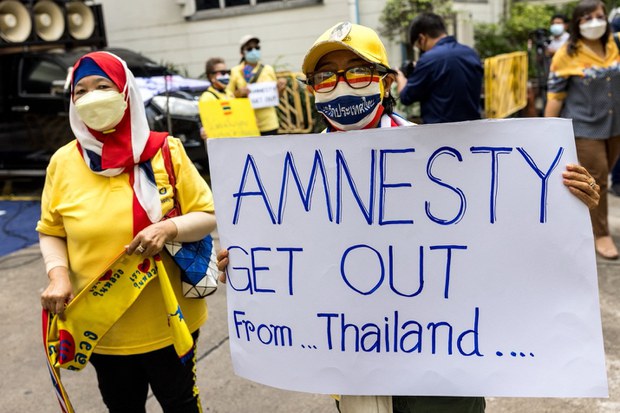Amnesty Promises to Carry on Work in Thailand amid Calls for Expulsion
2022.02.16
Bangkok
 A royalist supporter holds a sign during a demonstration in Bangkok against Amnesty International, Nov. 25, 2021.
A royalist supporter holds a sign during a demonstration in Bangkok against Amnesty International, Nov. 25, 2021.
Amnesty International vowed Wednesday to carry on with its work to promote and protect human rights in Thailand, despite Thai royalist calls to have the London-based watchdog group expelled for allegedly supporting anti-monarchy protests by pro-democracy youths.
Since November, pro-royalist activists have been protesting against Amnesty’s country branch, collecting signatures in an online petition to kick the group out of the kingdom.
Amnesty “has had a longstanding presence in Thailand and is committed to continuing to promote and protect human rights for people in the country,” the group said in a statement on Wednesday.
Seksakol Atthawong, an ultra-royalist senior aide to Thai Prime Minister Prayuth Chan-o-cha, has been spearheading the move to expel Amnesty from Thailand. The online petition, which he started in November, has gathered more than a million signatures.
Seksakol plans to submit the petition to the Thai Ministry of Interior and the National Security Council on Thursday, he told local media in recent days.
“As a global movement with operations in more than 70 countries and members in 150 countries and territories, no matter where we operate, our job remains the same: to prevent, monitor, and hold states, corporations, and others accountable for abuses of human rights under international law,” Kyle Ward, the deputy secretary-general of Amnesty, said Wednesday.
Amnesty offers “constructive recommendations to authorities on steps they can take to uphold their international human rights obligations.”
“We will continue to do this independently and impartially on the basis of facts. In response to the anti-Amnesty campaign and related investigation, we continue to answer any questions the Thai government may have about our work in the country,” Ward said.
BenarNews reached Seksakol on Wednesday, but he declined to comment. Other government agencies were not available to comment because it was a public holiday.
In the past, Seksakol accused Amnesty of cooperating with the youth-led protestors seeking monarchy reform in the country, saying they were against the constitution of Thailand.
On Nov. 26, Prayuth, who came to power in 2014 leading a military coup, announced an investigation into Amnesty International Thailand. It is not clear what has happened to that investigation. The prime minister also has not commented publicly on the petition.
A retired Thai diplomat said expelling Amnesty would make Thailand “look even more dictatorial and yields no benefits in practice.”
“Though they won’t have a physical presence in Thailand, they can still monitor the situation from elsewhere. And there are many rights groups ready to investigate Thailand. Kicking them out means heavier criticism,” Russ Jalichandra, a former Thai ambassador to Mozambique and Kazakhstan, told BenarNews on Wednesday.
Amnesty’s license
On Tuesday, a Labor Ministry official said the government was considering whether to renew the license for Amnesty’s office in Bangkok, which expired on Jan. 20.
Boonchob Suthamanaswong, the ministry’s permanent secretary, said Amnesty had not responded to the Thai authorities’ request for supporting documents for consideration.
The documents sought included an explanation on how Amnesty conducts activities impartially and without misleading society, whether its actions undermine national security. The ministry also sought Amnesty’s reports, which Boonchob said, the organization had failed to provide.
A labor ministry committee regulating foreign business entities stipulates that foreign entities must be non-profit and politically free.
Separately, Thai authorities are seeking to pass a controversial law regulating not-for-profit organizations in the country, including prohibiting groups from engaging in all activities that could be “detrimental to national security or social harmony.”
Prayuth’s cabinet in January approved the draft bill in principle. However, dozens of local and international groups have opposed the bill, saying it threatens civil society’s work and hampers freedom of expression.
The law “could have severe consequences for all civil society in Thailand, and Amnesty has repeatedly called on the government to withdraw the bill and seek further consultation,” Ward said Wednesday, accusing “growing intolerance of human rights discourse among Thai authorities.”
Nontarat Phaicharoen in Bangkok contributed to this report.







